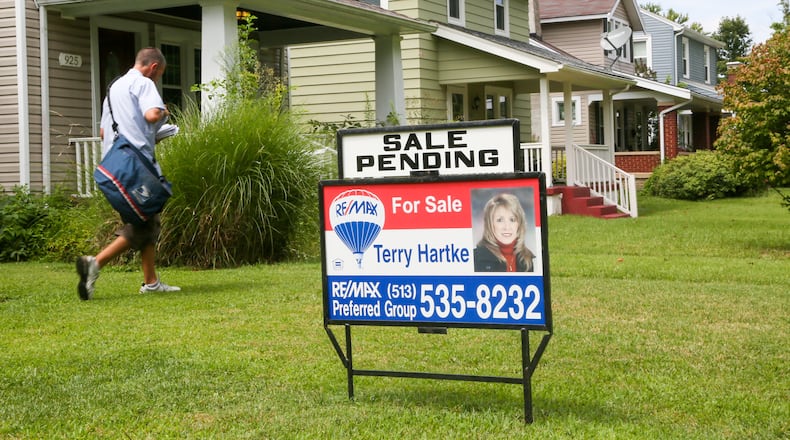RELATED: Middletown leader details hurdles to overcome to solve housing issues
It will take a variety of tools and policy changes to correct the problem, Adkins told the group, including the possible use of eminent domain in some circumstances, which he said “scares the hell out of people.”
“If we want to look like the rest of Butler County we would need to reoccupy 552 vacant houses in Middletown,” he said. “So let’s be sophisticated about where we’re doing it and why we’re doing it. Let’s renovate those houses, let’s get them reoccupied, let’s use in-fill construction on a very reasonable basis and put the place back together where it makes sense.”
Some of the major issues the city is facing with its housing stock are:
- Between 2011 and 2015, the city's property values dropped 13.5 percent, or nearly $58.4 million.
- The median home value in Middletown dropped from $107,500 in 2000 to $93,700 in 2015. Overall, 78.4 percent of Middletown's home values were below $150,000.
- About 79 percent of the city's housing was built before 1980 and 21.5 percent was built before 1939.
- More than 49 percent of housing is two bedrooms or less, meaning people who have larger families and want to move up to the next housing level are forced to go elsewhere.
- The percentage of owner-occupied housing is 52.7 percent, while rentals are at 47.3 percent.
Adkins said he doesn’t plan to ask the land bank board for money, but he hopes to be able to use tools the land bank has access to but isn’t currently utilizing. One of those tools involves rehabbing rather than eradicating properties.
Up to this point the land bank has only dealt with beating back blight through demolition. It has razed 615 houses at a cost of $6.9 million.
MORE: Middletown officials considering new housing options in the city
Adkins said the city is just starting to come up with a plan to right their housing stock and it will likely be one year to 18 months before he will need the land bank’s help.
One idea he might grab from the city of Cleveland is there the land bank seizes a house and then sells it to a qualified house “flipper” for $5,000. He said they tell the flipper what they want done to the house to make it viable. The renovator must use a Cleveland realtor to sell it. In the end, they have a new homeowner who is paying property and income taxes, a good house that will last decades, and the land bank makes money.
He said Cleveland has done 1,400 of these flipped homes and only two homeowners have defaulted.
“I think we can show council and I think we can show the land bank how this can strengthen (Middletown and Hamilton) in a very significant way,” Adkins said. “Let us show you, let us try, let us show you what we can do. We’ve done well with demolition. Every time you’ve given us a little leeway we’ve utilized it well.”
MORE: Land Bank Board: Delinquent tax percentage adequate
Hamilton City Councilman Rob Wile, who is a land bank board member, said he would definitely back Adkins’ plan if he were still going to be on the board. His term ends when he leaves city council in December.
“Hamilton and Middletown are the core of the county so I would encourage, as we look at the broader message, that a healthy Hamilton and a healthy Middletown is a great thing for the county,” Wile said.
Any change in the scope of the land bank’s “toolbox” would require county commissioner approval.
Butler County Commissioner Don Dixon said it is a good thing Middletown is “telling it like it is” and asked if the city council “has the stomach” to tackle the problem, because it is going to get ugly.
“That’s going to be a pretty ugly picture,” he said. “You can say ‘yeah I know’ but you don’t get voted on. You don’t have to take people out of those homes and all the ripple effect.”
Steve Bohannon, a city council member and chairman of the Middletown Real Estate Investors Group, the city’s landlord association, said the local landlords are supportive of getting houses owner-occupied.
“I think it’s a good thing…,” Bohannon said. “If you have an owner-occupied house, they will take care of it and it will be better for the people in the neighborhood.”
Part of the plan is also to get some bigger, more expensive homes in the city so people don’t have to move away. The city’s Economic Development Director Jennifer Ekey said they have hundreds of open positions throughout the city, everything from anesthesiologists to entry level, so they need to attract higher end home builders.
Dixon said the city needs to address not only its housing picture, but the business stock. He said the county is ready to help with job creation so Middletown can return to its former status as a premiere city.
“The county is on a 2020 plan when we’ll have no general fund debt in 2020,” Dixon said. “We’re ready to step up and be a partner and I’m not talking about $500,000, I’m talking about $5 million. So the county has positioned itself to be able to help. Doug is the first one that’s ever told this story. I think now that you recognize how serious it is we all have to get behind it.”
Staff writer Ed Richter contributed to this article.
About the Author
